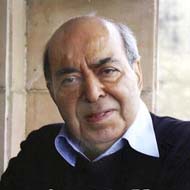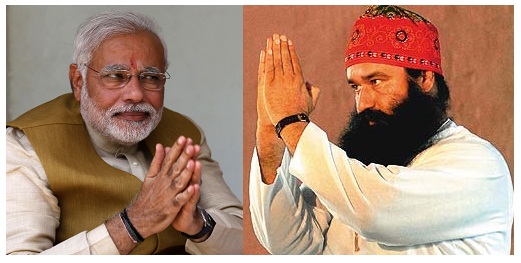
The BJP has been courting the Babas because it embodies the concept of religious men leading the country rather than its politicians. After the Gurmeet ‘Ram Rahim’ episode, the RSS is in a dilemma and is simply playing along.
The RSS is still feeling its way to translate its concept of Ram Rajya into reality as it takes time to completely change the narrative.
Beyond the conviction of Baba Gurmeet Ram Raheem Singh leading to mayhem and deaths in Haryana in particular lies a preview of the RSS-inspired BJP scheme of things for a future India.
The Baba, with his cult following, was a figure of considerable importance and politicians of all hues humored him for the votes he could deliver. But there was a deeper purpose for the BJP and its Haryana unit to court the Baba because it embodied the concept of religious men leading the country, rather than its politicians. Putting it another way, politicians would rule the country in concert with religious leaders. This is true despite the homilies of Prime Minister Narendra Modi in radio broadcasts and otherwise.
It is no secret that the Baba endorsed the BJP in the Haryana assembly elections which tipped the scales in its favor. In gratitude, the entire state cabinet went to the Baba’s headquarters to pay obeisance. Besides, photographs of the Baba with Chief Minister M.L. Khattar sweeping the floor and the Sports minister, Mr Anil Vij, with folded hands in his presence after plying him with a check for lakhs of rupees have become iconic images. Prime Minister Modi himself lauded the Baba for his “Clean India” campaign.
Where does this glimpse of religious leaders at the forefront take India? The RSS itself is confused and seems to be playing the game as it goes along. It is, of course, for a Hindu India or Hindutva as it defines it. Many of the myths it has created about the blissful days of ancient India are common knowledge. We know about planes flying, of heads transposed and plastic surgery as common features of the good old days.
In building a new India of their dreams, RSS leaders and their BJP followers needed an inventive narrative. The Mahatma was, of course, immediately appropriated. And the BJP raided the Congress repository of heroes on a mass scale. The Congress, after all, was the leader of the independence movement, with the RSS often ambivalent, if not complicit with the British rulers.
Thus, in addition to the Mahatma, felled by an RSS sympathizer, the BJP appropriated Sardar Vallabhbhai Patel and many others, as the need arose. Its main target was the maker of modern democratic India, Jawaharlal Nehru. He was too cosmopolitan, too influenced by the West for the BJP’s liking, vociferous as it was in striking the nationalist and native pose. The BJP is now in the process of writing a new narrative of modern India in which the towering personality who shaped the country is to be dismissed as one of many former prime ministers, his memorial to be shared by all.
By all indications, the RSS is still feeling its way to translate its concept of Ram Rajya into reality. The Constitution is one impediment, the judiciary another, and above all the very diversity – in religious, ethnic and other terms – in governing the country. The last task falls into the lap of the Prime Minister, himself brought up in the cradle of the RSS but conscious of the pitfalls of running the country on narrow nationalist and religious lines.
With the general election of 2019 already looming on the horizon, the contest between the RSS, the legitimizing authority of the Sangh Parivar, and a practicing politician of Mr Modi’s stature is likely to increase. In the end, there must be a compromise between these two poles of power while the larger ideological issue is sorted out.
What to do with babas and their transgressions is another matter. There are swamis and great religious leaders who lead exemplary lives and do good. But the field has become crowded with charlatans and conmen of various kinds who trade on the gullibility of the poor and their superstitious beliefs to live well and exercise influence on politicians in search of votes. The BJP is particularly susceptible to their wiles because of its own myths and the status it accords to its own concept of a Hindu rashtra.
Sober thinkers in the Sangh Parivar must realize that it takes time to change the narrative of nearly a century of the independence movement and the glorious decades of Congress rule after India won independence. We still live in a country shaped by the giants of the independence movement, almost all of them belonging to the Congress. Yes, textbooks are being revised to rewrite history to obliterate the long decades of Muslim rule. The beautiful Taj Mahal stands uneasily in the Uttar Pradesh of Yogi Avidyanath.
The Sangh Parivar is not the first conglomerate to rewrite history. The Communists in Russia and elsewhere were quite proficient in demolishing old heroes – in Moscow lodged in a park of old curiosities – while Ukraine has also archived its Communist past and the United States is seeking to demolish statues of Confederate greats in the shape of statues of slave owners after they lost the civil war. The Parivar is repeating history with a twist by making Jawaharlal a non-person.
Future developments in a changing India will depend upon the Parivar leaders in bringing about their revolution of a Hindu India. Like all ideologues, they are men in a hurry – women never play a leading role in their scheme of things – but here again the conflict is between ideology and governance.
Two people above all will influence the outcome: RSS chief Mohan Bhagwat and Mr Modi, the latter in his political garb. They are unified in their ideology but divided in their responsibilities. We shall not have to wait for long to find out.
(The author is a renowned journalist)
